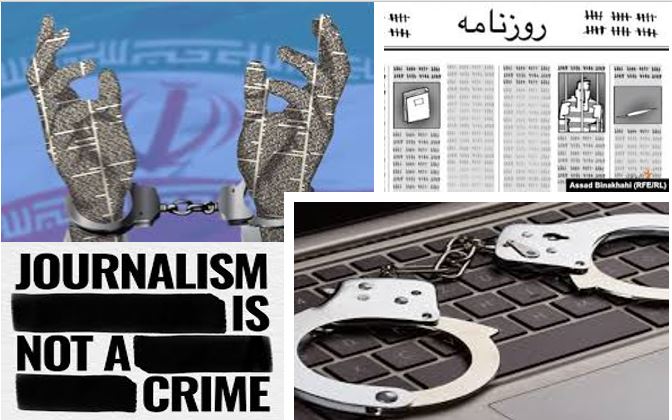On the International Day to End Impunity for Crimes against Journalists, Reporters Without Borders declared Iran the largest prison for journalists and ranked it as the 173rd out of 180 countries. The reason is the arrest and imprisonment of journalists and even their murder.
In 2013, the UN General Assembly designated November 2,” International Day to End Impunity for Crimes against Journalists.”
On this day, we need to know what the situation of journalists in Iran under the mullahs’ regime is? In Iran, it is not only crimes against journalists that go unpunished. The regime itself commits crimes against journalists.
Regime’s crimes against Iranian journalists
The brutal murder of Iranian Canadian journalist Zahra Kazemi is a clear example of the regime’s crimes against Journalists. On June 23, 2003, she arrested by Evin Prison agents for reporting on a gathering of arrested students’ families in front of Evin Prison. Ms. Kazemi then brutally tortured on the orders of criminal judge Saeed Mortazavi, and two weeks later died under torture.
Sattar Beheshti, a young blogger, arrested on June 29, 2012, for publishing anti-regime posts on his blog. He tortured by the regime’s henchmen to death a few days later.
According to reports, on September 29, 2020, photographer and citizen journalist Soheil Arabi transferred to solitary confinement in Rajai Shahr Prison. His crime was exposing the unsanitary and deplorable conditions of the Greater Tehran Penitentiary.
Moreover, Kowsar Karimi arrested on August 23, 2020, for publishing the news of the IRGC‘ attack on the village of Abolfazl in Ahvaz.
On October 28, 2020, Reporters Without Borders announced that “Combined total of 128 years in prison for 10 Iranians with journalism links.”
The mullahs’ regime cannot tolerate his own media reporters and has arrested and imprisoned many of them for reporting on people’s problems or even tweeting.
Because of this severe repression of journalists, Reporters Without Borders has named Iran the largest prison for journalists and ranked Iran as 173 out of 180 countries of press freedom.
In a message sent on his Twitter page on the occasion of this day, the UN Secretary-General said:
“I am appalled at the continued and increased numbers of attacks against journalists and media workers around the world. Authorities must ensure that all attacks against journalists are thoroughly investigated and that those responsible are held accountable”.
But the question is, who should conduct such an investigation in the religious dictatorship in Iran? Is it possible that the regime and its judicial and governmental officials who are responsible for the repression, torture, imprisonment, and execution of journalists do this?
As a result, the Iranian people and their resistance demanded the world and the UN to expel the United Nations’ regime for its crimes, including repressing journalists and stifling their voices.
Of course, soon, the Iranian people and their organized resistance will overthrow this regime. Freedom and democracy in Iran will replace tyranny and repression. Thus, Iran will be among the free countries of the world.
